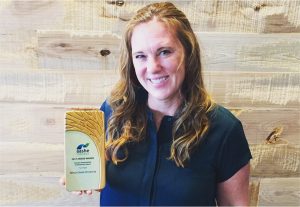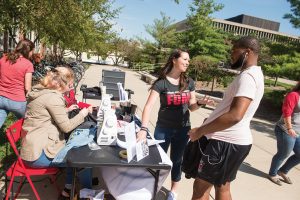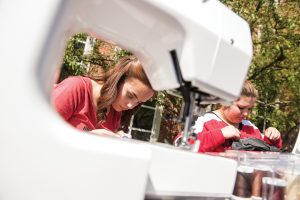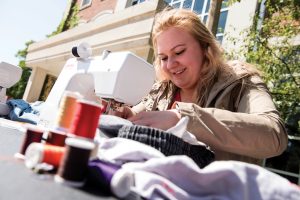An elderly man approached a couple of students sitting in front of a sewing machine in the Coffee Hound and asked what they were doing. Repairing clothes, they told him, and noticing a large rip in his jacket, suggested he get it fixed.
The man told them he didn’t have any money; he came to the coffee shop only because it gave him a free cup of coffee. When Torre Riscossa ’17 told him the sewing service was free, he shook off his coat and handed it over.
Appears In
Saving the world: One class project at a time
Healthy habits: Nursing students working in schools to improve young people’s lives
Introduction to Redbird Impact
Get involved: Upcoming civic engagement opportunities at ISU
ISU’s Innovation Consulting Community: Teaming students with mentors to serve real clients
Redbird Impact spotlight: Center for Community Engagement and Service Learning
Redbirds contribute to Harvey relief efforts
Nominate Homecoming 2018 Royalty
Across continents: Chinese alumni still appreciate ISU’s open door
How we met: Stefani Rudd and Bryan Concannon
Always a Redbird: Retiring alumni director still ISU’s cheerleader
Mail to the editor: April 2018
Inside Look: Owen Strength and Conditioning Center
Where are they now? Doug Lamb
Pause for applause
Entrepreneur chosen for 2018 honorary degree
Redbird legacy: Simios family forges strong ties to College of Business
Reggie Reads: April 2018
State higher ed board picks President Bowman as leader
Celebrating excellence: Two Redbirds honored as superior athletes and scholars
Illinois State publication now three issues annually
Conference picks Adam to receive courage award
Softball team mourns volunteer coach
Muller contract extended
Valley recognizes three ISU legends
Redbird romance: The story behind ISU’s love bench
Harding named executive director of Alumni Engagement
Saving the world: One class project at a time
Largest faculty cash gift in ISU history to support international business education
Illinois State alumna key contributor to Academy Award- and Golden Globe-nominated animated film
2018 Alumni Awards recipients
More than 250,000 items added to Circus Collection
“I will never forget his face when we gave him his jacket back,” she said. “I had no idea that we could make such a big impact on someone by just fixing a little tear in a coat.”
That is one of many stories from Fix It Friday, a free basic mending, sewing, and clothing repair service launched by Illinois State students in 2016. Like a food truck, Fix It Friday pops up twice a month from September through April in locations across campus and throughout Bloomington-Normal.
The project was the brainchild of Elisabeth Reed, an instructional assistant professor in the Department of Family and Consumer Sciences. She wanted to create a civic engagement project for her fashion design and merchandising students and met with a couple of them to discuss her idea.
“One of the students said, ‘All right, this is good. Let’s just do it!’” Reed recalled. “It got me out of my comfort zone.”
Reed and her students walked through the design studio, collecting what they could borrow for the day—a couple of older, rarely used sewing machines, random thread, a box of buttons. The group held its first event on the Quad, and Reed wondered if anyone would come. Then university grounds crew workers started arriving with ripped cargo shorts and T-shirts.
The purpose of Fix It Friday is to repair a little of the world by fixing clothes that would otherwise end up in a landfill, or be sent to overstuffed thrift stores. Reed, however, is finding an unintended benefit: Interactions with customers are building students’ confidence and social skills.
“We really set out to fix clothing and educate people about overconsumption. But it’s been so positive for students to get out of their bubble on campus, and get them engaging with people in the community.”
One woman brought her mother’s worn quilt to the students, mentioning it was the only item left of hers. At a community recreation center, senior citizens talked to students about their sewing days, given up when their eyesight or steadiness faded.
Last fall, sophomore Aaron Harwick was hustling to class with a ripped backpack. He stopped when he saw Fix It Friday sewing machines set up in front of Schroeder Hall.
“It was perfect,” he said. “I’m not bad at sewing but I don’t have a needle and thread, and when there’s a sewing machine in front of you and capable people ready to help, you can’t ask for any more.”
Junior Darrin Marshall followed Fix It Friday on Facebook and came prepared. Unzipping his backpack, he pulled out a pair of ripped jeans and two T-shirts. “I tried to fix this,” he said, handing over a gray T-shirt with a hole partially closed with wide stitches of red thread.
Senior Paulina Wietocha was at one of the machines. The family and consumer sciences teacher education major has been sewing for nine years; her grandmother was a seamstress in Poland. “No matter how small the job is, you don’t want to do it yourself,” she said. “We can fix it.”
Students who have sewing ability, or have taken the Family and Consumer Sciences’ introductory sewing course, can volunteer to do the minor repairs, like replacing buttons and fixing tears. Fix It Friday doesn’t do alterations, zippers, anything that would take away business from area alteration shops. Students even hand out a list of area tailors and sewing shops.
Senior Sophia Araya helps coordinate Fix It Friday. She created The Beginner’s Clothing Repair Guide, a booklet for customers that provides step-by-step instructions on how to do minor repairs. She is also building a website, and there are plans for how-to videos. The fashion merchandising major only knew a little about sewing before she became involved. She was interested in the project because of its focus on sustainability.
“I like projects when there’s more meaning behind them,” she said. “We want to extend the life cycle of the clothes you’re wearing.”
The average American throws away 70 pounds of clothing and textiles each year, according to the Council for Textile Recycling. Reed said the fashion industry has changed in a way that promotes waste. Rather than focusing on four distinct seasons, “fast fashion” brings nearly daily shipments of cheap clothing to stores. “There used to be four seasons of fashion, and now there are 365,” Reed said.
Fix-it Friday is receiving local and national recognition. The University’s Office of Sustainability provided a $5,000 startup grant in 2016 after Maddie Willer ’17 presented the proposal to a student-led committee.
“The students loved it,” said Missy Nergard, director of the Office of Sustainability. “She got that program up and running in about four weeks. To get it from start to finish in that amount of time is incredible.”
Reed received a $5,000 Scholarship of Teaching and Learning university research grant to collect student and customer data on the benefits of civic engagement. She will share the results with other universities and at international conferences. In November, she accepted a national Campus Achievement Award from the Association for the Advancement of Sustainability in Higher Education. She also received a SCORE grant from the Illinois Education Association in 2017. And Fix It Friday received the 2017 Outstanding Service Program Award from the University’s Dean of Students Office.

Students took Fix It Friday to Chicago last April, repairing items for visitors to the Chicago Fair Trade Association’s Fashion Revolution Week. The week highlights individuals and organizations working to change the way clothing is sourced, produced, and consumed so it is made in a safe, clean, and fair way.
More than 100 customers have salvaged clothing at Fix It Friday, and more businesses are asking to host the project. Taking it on the road will be easier with a fold-up storage cart and sewing table designed and built by the ISU Engineering Technology Club. This spring semester, Fix It Friday plans to host events at the Bloomington Public Library, the Tool Library in downtown Bloomington, and Coffee Hound in Normal.
Students do not accept donations or receive extra credit. Fix It Friday is strictly volunteer service, and Reed is hoping students from other majors will join in.
“It’d be great to have volunteers from across campus,” she said. “I want our fashion students to be the lead, but all volunteers are welcome.”
How to get involved
Students with sewing experience or who have taken the introductory sewing course in Family and Consumer Sciences can volunteer for Fix It Friday. Events are held about twice a month from September through April on campus and throughout Bloomington-Normal.
For more information on volunteering or hosting an event, contact Elisabeth Reed, instructional assistant professor, at ereed2@Illinois State.edu. Follow Fix It Friday at isufixitfriday.org or Facebook.com/IllinoisStateFixItFriday.
Kate Arthur can be reached at kaarthu@IllinoisState.edu.




